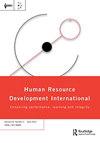领导层应对新冠肺炎:美国和印度教育部门的比较分析
IF 3.8
Q2 MANAGEMENT
引用次数: 5
摘要
摘要随着新冠肺炎疫情席卷全球,教育领导者实施了危机管理计划,以减轻其对学生、教职员工及其家人的影响。我们研究了世界上最大民主国家教育部门的五个案例:美利坚合众国和印度。通过文献分析和半结构化访谈,我们调查了教育领导层在危机各个阶段的反应。在我们研究的案例中,美国领导人比印度领导人更经常采用协商决策方法。此外,基于群体的方法只在美国的领导人中表现得很明显。两国领导人都富有创造力,善于沟通,既收集信息又传播信息。领导者必须跳出框框思考,以满足学生和教职员工以及他们所在地区社区的需求。资源识别和分配,克服农村和城市地区之间的数字鸿沟,以及安全设备的获取和适当分配,只是学术领袖所面临的一些挑战。这项研究通过考察管理危机所需的能力,以及国家文化对危机期间决策行为的影响,对危机领导力做出了重要贡献。本文章由计算机程序翻译,如有差异,请以英文原文为准。
Leadership response to COVID-19: a comparative analysis of the education sector in USA and India
ABSTRACT As the COVID-19 pandemic overwhelmed the world, educational leaders implemented crisis management plans to mitigate its impact on their students, faculty, staff, and their families. We studied five cases in the education sector in the world’s largest democracies: the United States of America and India. Through document analysis and semi-structured interviews, we investigated the responses of educational leadership during each stage of the crisis. In the cases we studied, leaders in USA adopted a consultative decision-making approach more often than their Indian counterparts. Moreover, group-based approach was evident only among leaders in USA. Leaders in both countries were creative and diligent in communicating, both to gather information as well as for dissemination. Leaders had to think out of the box to meet the needs of students and faculty, as well as the communities in their immediate areas. Resource identification and distribution, overcoming the digital divide between rural and urban areas, and the acquisition and appropriate allocation of safety equipment are just a few of the challenges addressed by the academic leaders. This study makes an important contribution to crisis leadership by looking at competencies needed to manage a crisis, and the influence of national culture in decision-making behaviours during a crisis.
求助全文
通过发布文献求助,成功后即可免费获取论文全文。
去求助
来源期刊

HUMAN RESOURCE DEVELOPMENT INTERNATIONAL
MANAGEMENT-
CiteScore
11.40
自引率
11.10%
发文量
43
期刊介绍:
Human Resource Development International promotes all aspects of practice and research that explore issues of individual, group and organisational learning and performance. In adopting this perspective Human Resource Development International is committed to questioning the divide between practice and theory; between the practitioner and the academic; and between traditional and experimental methodological approaches. Human Resource Development International is committed to a wide understanding of ''organisation'' - one that extends through self-managed teams, voluntary work, or family businesses to global enterprises and bureaucracies. Human Resource Development International also commits itself to exploring the development of organisations and the life-long learning of people and their collectivity (organisation), their strategy and their policy, from all parts of the world. In this way Human Resource Development International will become a leading forum for debate and exploration of the interdisciplinary field of human resource development.
 求助内容:
求助内容: 应助结果提醒方式:
应助结果提醒方式:


